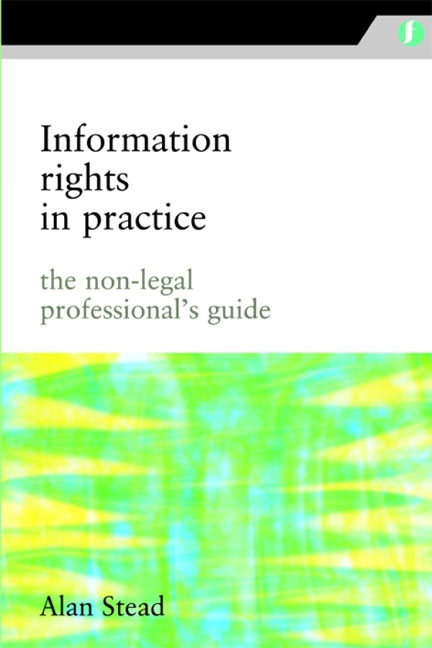Book contents
- Frontmatter
- Contents
- Acknowledgements
- Table of statutes and case law
- Abbreviations
- 1 Introduction
- 2 Data Protection Act 1998
- 3 Definitions of personal data
- 4 The scope of the Data Protection Act
- 5 The data protection principles
- 6 Access to personal data
- 7 Data sharing
- 8 The Freedom of Information Act 2000 and Environmental Information Regulations 2004, SI 2004/3391
- 9 Scope of the Freedom of Information Act 2000 and the Environmental Information Regulations 2004
- 10 Application of exemptions and exceptions
- 11 The public interest test
- 12 Publication schemes
- 13 Compliance, the Information Commissioner and the Information Tribunal
- 14 Disclosure logs
- 15 Records management – Section 46 code of practice
- 16 Other legislation
- 17 Interaction of the legislation
- 18 Summary
- Appendix 1 Data protection principles
- Appendix 2 Flow chart of FOI
- Appendix 3 Exemptions and exceptions under the Freedom of Information Act 2000 and the Environmental Information Regulations 2004
- Appendix 4 Bibliography and useful web addresses
- Appendix 5 Published standards for records management
- Index
8 - The Freedom of Information Act 2000 and Environmental Information Regulations 2004, SI 2004/3391
Published online by Cambridge University Press: 09 June 2018
- Frontmatter
- Contents
- Acknowledgements
- Table of statutes and case law
- Abbreviations
- 1 Introduction
- 2 Data Protection Act 1998
- 3 Definitions of personal data
- 4 The scope of the Data Protection Act
- 5 The data protection principles
- 6 Access to personal data
- 7 Data sharing
- 8 The Freedom of Information Act 2000 and Environmental Information Regulations 2004, SI 2004/3391
- 9 Scope of the Freedom of Information Act 2000 and the Environmental Information Regulations 2004
- 10 Application of exemptions and exceptions
- 11 The public interest test
- 12 Publication schemes
- 13 Compliance, the Information Commissioner and the Information Tribunal
- 14 Disclosure logs
- 15 Records management – Section 46 code of practice
- 16 Other legislation
- 17 Interaction of the legislation
- 18 Summary
- Appendix 1 Data protection principles
- Appendix 2 Flow chart of FOI
- Appendix 3 Exemptions and exceptions under the Freedom of Information Act 2000 and the Environmental Information Regulations 2004
- Appendix 4 Bibliography and useful web addresses
- Appendix 5 Published standards for records management
- Index
Summary
Introduction
So far we have looked at personal data and this still needs to be kept in mind while we examine the next two enactments. With these, however, the main objective is the release of information rather than the security and handling of the information. In later chapters we will also need to examine some of the additional elements such as records management, public registers and the way in which environmental data is stored.
Each of the three pieces of legislation is unique and at the same time shares many common features with the others. The Data Protection Act is unique in that it describes not just how data is accessed but also how data is collected, kept and used. This Act is the only one that relates to everyone, not just to the public sector.
The Freedom of Information Act 2000 is unique in that it is the only Act of the three not based directly on European law. There is also a separate Freedom of Information Act in Scotland (Freedom of Information (Scotland) Act 2002), which has the same basic provisions but in which the sections come in a different order. The references to sections in these chapters are to the England, Northern Ireland and Wales Act.
The Environmental Information Regulations 2004 are unique in that they are a statutory instrument and not a primary Act and the only one of the information rights trilogy that does not permit other legislation to take precedence. This will be explained in Chapters 9 and 10.
In this chapter it is intended to give a brief overview of the Freedom of Information Act 2000 and the Environmental Information Regulations 2004, with the detail being studied in more depth in the following chapters.
The Freedom of Information Act 2000
The Freedom of Information Act 2000 was enacted to allow access to public sector information. There is a presumption within the Act, therefore, that information will be released, although there are 26 instances when disclosure can be disallowed (these are explained in detail in Chapter 10).
Every single request for information that a public authority receives in writing is, in law, a Freedom of Information Act request.
- Type
- Chapter
- Information
- Information Rights in PracticeThe non-legal professional's guide, pp. 75 - 82Publisher: FacetPrint publication year: 2008



